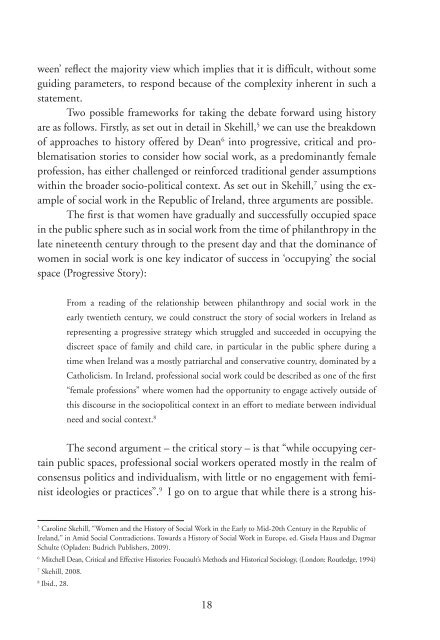Teaching Gender in Social Work - MailChimp
Teaching Gender in Social Work - MailChimp
Teaching Gender in Social Work - MailChimp
Create successful ePaper yourself
Turn your PDF publications into a flip-book with our unique Google optimized e-Paper software.
ween’ reflect the majority view which implies that it is difficult, without some<br />
guid<strong>in</strong>g parameters, to respond because of the complexity <strong>in</strong>herent <strong>in</strong> such a<br />
statement.<br />
Two possible frameworks for tak<strong>in</strong>g the debate forward us<strong>in</strong>g history<br />
are as follows. Firstly, as set out <strong>in</strong> detail <strong>in</strong> Skehill, 5 we can use the breakdown<br />
of approaches to history offered by Dean 6 <strong>in</strong>to progressive, critical and problematisation<br />
stories to consider how social work, as a predom<strong>in</strong>antly female<br />
profession, has either challenged or re<strong>in</strong>forced traditional gender assumptions<br />
with<strong>in</strong> the broader socio-political context. As set out <strong>in</strong> Skehill, 7 us<strong>in</strong>g the example<br />
of social work <strong>in</strong> the Republic of Ireland, three arguments are possible.<br />
The first is that women have gradually and successfully occupied space<br />
<strong>in</strong> the public sphere such as <strong>in</strong> social work from the time of philanthropy <strong>in</strong> the<br />
late n<strong>in</strong>eteenth century through to the present day and that the dom<strong>in</strong>ance of<br />
women <strong>in</strong> social work is one key <strong>in</strong>dicator of success <strong>in</strong> ‘occupy<strong>in</strong>g’ the social<br />
space (Progressive Story):<br />
From a read<strong>in</strong>g of the relationship between philanthropy and social work <strong>in</strong> the<br />
early twentieth century, we could construct the story of social workers <strong>in</strong> Ireland as<br />
represent<strong>in</strong>g a progressive strategy which struggled and succeeded <strong>in</strong> occupy<strong>in</strong>g the<br />
discreet space of family and child care, <strong>in</strong> particular <strong>in</strong> the public sphere dur<strong>in</strong>g a<br />
time when Ireland was a mostly patriarchal and conservative country, dom<strong>in</strong>ated by a<br />
Catholicism. In Ireland, professional social work could be described as one of the first<br />
“female professions” where women had the opportunity to engage actively outside of<br />
this discourse <strong>in</strong> the sociopolitical context <strong>in</strong> an effort to mediate between <strong>in</strong>dividual<br />
need and social context. 8<br />
The second argument – the critical story – is that “while occupy<strong>in</strong>g certa<strong>in</strong><br />
public spaces, professional social workers operated mostly <strong>in</strong> the realm of<br />
consensus politics and <strong>in</strong>dividualism, with little or no engagement with fem<strong>in</strong>ist<br />
ideologies or practices”. 9 I go on to argue that while there is a strong his-<br />
5<br />
Carol<strong>in</strong>e Skehill, “Women and the History of <strong>Social</strong> <strong>Work</strong> <strong>in</strong> the Early to Mid-20th Century <strong>in</strong> the Republic of<br />
Ireland,” <strong>in</strong> Amid <strong>Social</strong> Contradictions. Towards a History of <strong>Social</strong> <strong>Work</strong> <strong>in</strong> Europe, ed. Gisela Hauss and Dagmar<br />
Schulte (Opladen: Budrich Publishers, 2009).<br />
6<br />
Mitchell Dean, Critical and Effective Histories: Foucault’s Methods and Historical Sociology, (London: Routledge, 1994)<br />
7<br />
Skehill, 2008.<br />
8<br />
Ibid., 28.<br />
18

















